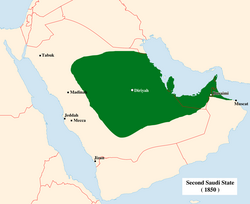Second Saudi State
| Emirate of Nejd | ||||||||||||
|
إمارة نجد ‘Imāra Najd |
||||||||||||
|
||||||||||||
| Capital | Riyadh | |||||||||||
| Languages | Gulf Arabic, Western Persian, Ottoman Turkish | |||||||||||
| Religion | WahhabiIslam | |||||||||||
| Government | Monarchy | |||||||||||
| Imam | ||||||||||||
| • | 1819–1820 | Turki ibn Abdallah ibn Muhammad(first) | ||||||||||
| • | 1889–1891 | Abdul Rahman bin Faisal(last) | ||||||||||
| History | ||||||||||||
| • | Reconquest of Riyadh | 1824 | ||||||||||
| • | Battle of Mulayda with the Al Rashid | 24 January 1891 | ||||||||||
|
||||||||||||
| Today part of |
|
|||||||||||
The Emirate of Nejd was the second Saudi state, existing between 1824 and 1891 in Nejd, the regions of Riyadh and Ha'il of what is now Saudi Arabia. Saudi rule was restored to central and eastern Arabia after the Emirate of Diriyah, the First Saudi State, having previously been brought down by the Ottoman Empire's Egypt Eyalet in the Ottoman–Wahhabi War (1811–1818).
The second Saudi period was marked by less territorial expansion and less religious zeal, although the Saudi leaders continued to be called Imam and still employed Wahhabist religious scholars. Turki bin Abdullah bin Muhammad's reconquest of Riyadh from Egyptian forces in 1824 is generally regarded as the beginning of the Second Saudi State. Severe internal conflicts within the House of Saud eventually lead to the dynasty's downfall at the Battle of Mulayda in 1891, between the forces loyal to the last Saudi imam, Abdul Rahman ibn Faisal ibn Turki, and the Rashidi dynasty of Ha'il.
...
Wikipedia


